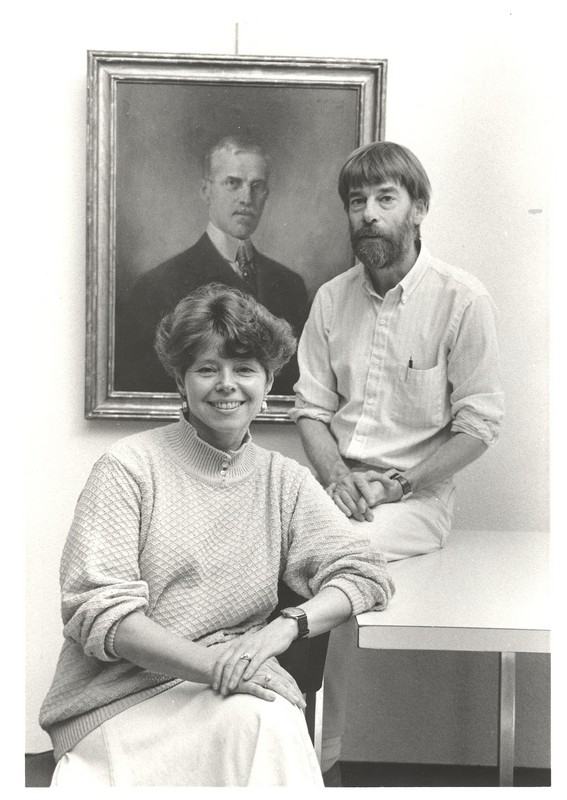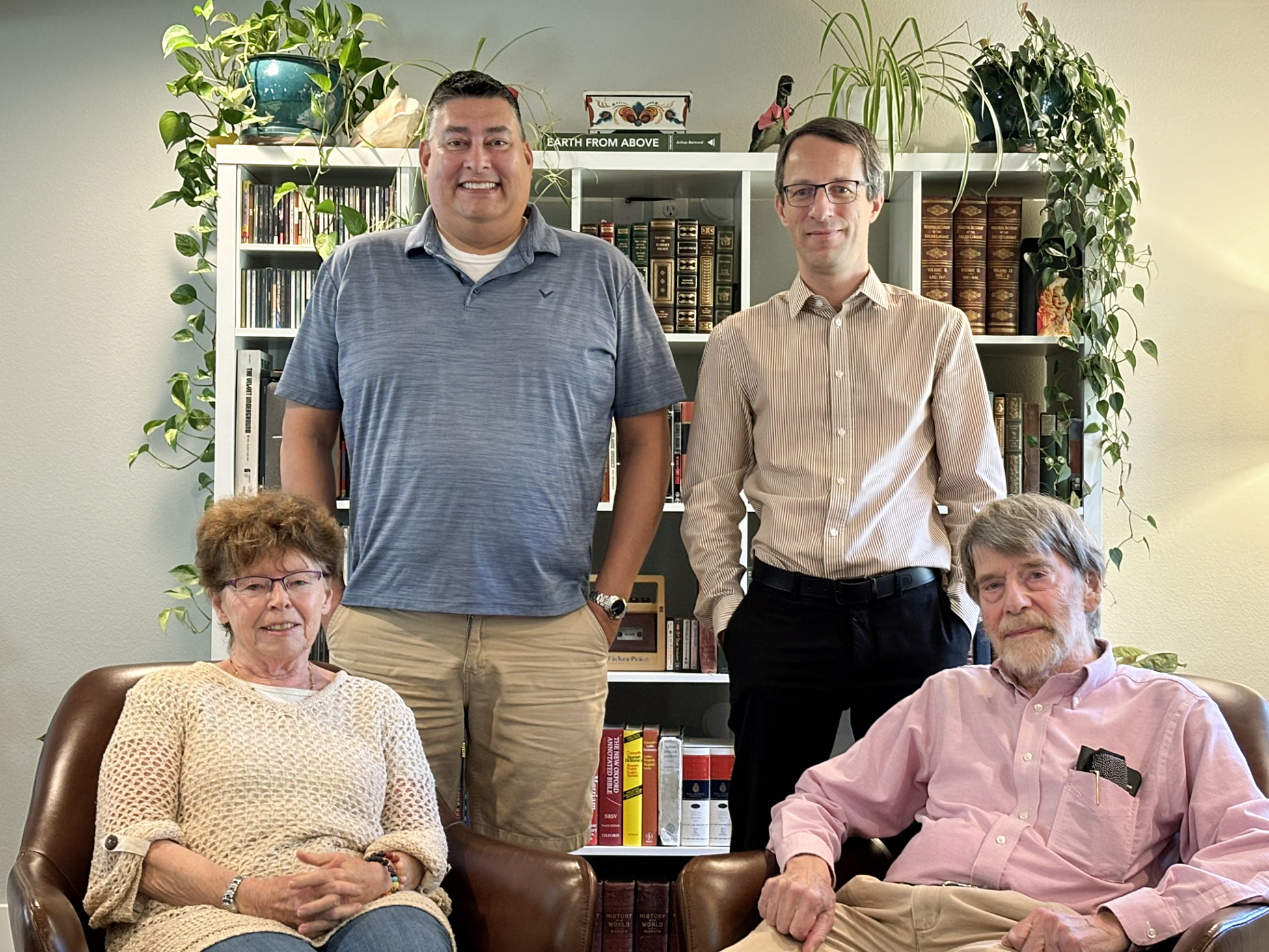A Short History
The Current Classics Department: 1965 - today
After several years of discussion among faculty, including philosopher J. Glenn Gray, Colorado College established a fulltime Classics Department in 1965, hiring its first member, Owen Cramer, who remains an active professor in the department. A Homerist and Woodrow Wilson Fellow with training in the literary/Poundian graduate program at the University of Texas (Arrowsmith, Sullivan, —scroll down to p. 188— Arion: A Journal of Humanities and the Classics), Owen has produced CC curriculum rather than classical scholarship. After a decade as a single-person department with no major, he was joined in 1976 by Marcia Dobson, a Harvard Ph.D. specializing in oracular language in Aeschylus, on a base of Renaissance studies (M.A. Tufts), who has gone on to deepen her interest and training in psychoanalysis with a second Ph.D. from the Pacifica Graduate Institute. Her combined work in psychoanalysis and classics led to the monograph Metamorphoses of Psyche in Psychoanalysis and Ancient Greek Thought: From Mourning to Creativity (Routledge, 2022). Marcia also remains an active member of the department, meaning she and Owen have served longer than any previous classics faculty at CC (including Charles Mierow’s 45 years on-and-off again at the college, for which see below).
 Owen and Marcia reintroduced a department major in 1980, joined in the formation of the Classics-History-Politics major in 1983 and the Comparative Literature major in 1986, and have worked with countless classics majors, some of whom are now faculty members themselves. On sabbaticals during this period they were replaced by Paul Roth (1980-81), Jim Tucker (1987-90), Lisa Hughes (1995-97 and 2002, who remained at the college in an adjunct role with Comparative Literature until 2022) and Craig Dethloff (2003). Trish FitzGibbon joined the department in 1999 as a part-time instructor in Latin and went on to teach nearly full time as a “visiting” professor and to direct the Summer Latin Institute through 2007-08. In 2006, Classics faculty ended a 40-year stay in Armstrong Hall, moving to offices and classrooms in Cossitt Hall (on the National Register of Historic Places), where they remain today.
Owen and Marcia reintroduced a department major in 1980, joined in the formation of the Classics-History-Politics major in 1983 and the Comparative Literature major in 1986, and have worked with countless classics majors, some of whom are now faculty members themselves. On sabbaticals during this period they were replaced by Paul Roth (1980-81), Jim Tucker (1987-90), Lisa Hughes (1995-97 and 2002, who remained at the college in an adjunct role with Comparative Literature until 2022) and Craig Dethloff (2003). Trish FitzGibbon joined the department in 1999 as a part-time instructor in Latin and went on to teach nearly full time as a “visiting” professor and to direct the Summer Latin Institute through 2007-08. In 2006, Classics faculty ended a 40-year stay in Armstrong Hall, moving to offices and classrooms in Cossitt Hall (on the National Register of Historic Places), where they remain today.
 With the permanent appointment —after a year as a Riley Scholar— of Sanjaya Thakur in 2009, a University of Michigan Ph.D. in classics with an archaeology M.A., the department entered into a shift of generations and a time of transformation. A Romanist specializing in Ovid and possessing a deep familiarity with the archaeology and topography of Italy and Greece (he has been both a Whitehead Fellow at the American School of Classical Studies, Athens and Director of the Classical Summer School at the American Academy in Rome), Sanjaya expanded the department’s offerings both on campus and in study abroad. Richard Fernando Buxton (Ph.D. University of Washington), who focuses on Greek historiography and the author Xenophon, began teaching at CC in 2014, becoming the fourth permanent member of the department in 2017. During this period the department has often operated with the additional help of many talented Visiting Assistant Professors (scroll down here for a list) and, since 2017, a language tutor to teach adjunct courses (known first as a CPC and currently as a CLCAC).
With the permanent appointment —after a year as a Riley Scholar— of Sanjaya Thakur in 2009, a University of Michigan Ph.D. in classics with an archaeology M.A., the department entered into a shift of generations and a time of transformation. A Romanist specializing in Ovid and possessing a deep familiarity with the archaeology and topography of Italy and Greece (he has been both a Whitehead Fellow at the American School of Classical Studies, Athens and Director of the Classical Summer School at the American Academy in Rome), Sanjaya expanded the department’s offerings both on campus and in study abroad. Richard Fernando Buxton (Ph.D. University of Washington), who focuses on Greek historiography and the author Xenophon, began teaching at CC in 2014, becoming the fourth permanent member of the department in 2017. During this period the department has often operated with the additional help of many talented Visiting Assistant Professors (scroll down here for a list) and, since 2017, a language tutor to teach adjunct courses (known first as a CPC and currently as a CLCAC).
The Earlier History of Classics at CC: 1876-1965
When President E. P. Tenney took over the inchoate Colorado College in 1876 (the summer of Custer’s Last Stand, of the Nation’s Centennial and of Colorado’s statehood), his first educational move was to hire W. D. Sheldon and send him to Colorado Springs to begin instruction in classics. Sheldon taught mostly preparatory students (it was six years before anyone graduated with a bachelor’s degree) and he gave himself to the general educational development of the new state with op/ed pieces on compulsory education and a leadership role in the state education association. Tenney built Cutler Hall and pushed a very ambitious, evangelical program for the College that came to grief over his land speculations in 1884. Sheldon stayed through the subsequent interregnum and the start of W.F. Slocum’s long administration, departing for the East in 1890. He later published a nice translation of works of Lucian: A second-century satirist: or, Dialogues and stories from Lucian of Samosata (Philadelphia and San Francisco, 1901, copy in the Special Collections, Tutt Library).
Slocum, a highly controversial figure eventually forced to resign after an investigation into his inappropriate and predatory behavior towards women at the college (students, staff, faculty and faculty wives), also oversaw a period in which CC first truly flourished as an institution (1888-1917). It was during his presidency that the current home of the Classics Department, Cossitt Hall, was built in 1914. Classics under Slocum was headed by Prof. M. C. Gile, who taught from 1892 until his death in 1916. (You can see Gile’s portrait hanging behind Owen and Marcia above in a photo from c. 1980.) Gile was a classic classics teacher: grammatically precise and demanding, gentle and understanding. He was also a community leader, a pillar of the First Baptist Church (his background was Andover and Brown) and a founder of the Colorado Springs National Bank with Willis Armstrong ‘99 as head teller (subsequently CEO and a long-time CC trustee): after several buy-outs the bank has joined Wells Fargo, but the Gile and Armstrong descendants continue strong in Colorado Springs and in support of CC.
Another Slocum-era professor was Ernest Bréhaut, who taught Latin and history and, after leaving CC in 1911, published what was for long the standard translation of Cato the Censor on Farming (New York, 1933). He was followed by CC’s first woman Ph.D. professor, Leila Clement Spaulding, whose 1911 Columbia dissertation was on The “Camillus” Type in Sculpture. Spaulding taught only until her 1914 marriage to local real estate man Edward Kent.
When the Slocum presidency ended in disgrace in 1917, with the loss of many of the era’s faculty, Gile’s successor, Princetonian Charles Christopher Mierow became a faculty leader, Acting President (1923-25) and President (1925-33). Mierow, a disciple of Andrew Fleming West of the Princeton Graduate College, studied classics as part of a tradition of Christian humanism. He worked on Jordanes’ Gothic History, of which he published the standard English translation (Princeton, 1908), Isidore of Seville and Otto of Freising (The two cities; a chronicle of universal history to the year 1146 A.D., translated with commentary, New York, 1928). He celebrated the 12th century Renaissance in the construction of Shove Chapel (1931), and he also, incidentally, presided over the end of the College’s Latin requirement (also 1931).
Mierow’s other duties meant that classics was taught in his time largely by others: his younger brother Herbert from 1918-43, Dorothy Printup from 1921 (when she left her University of Chicago Ph.D. dissertation project on Plautine comedy to replace Herbert Mierow as he worked on his M.A. at Princeton) until 1925 when, now married to the historian Archer Hulbert, she relinquished the duties to Marjorie Davis ‘19 (who taught from 1925-28 and whose M.A. thesis on Roman mining is in Special Collections). Dorothy Printup Hulbert, after her first husband’s death in 1933, gave her scholarly attention to his unpublished work on western history, continuing in that field through many years and, as Dorothy Bryson, receiving an honorary LLD degree in 1989. Meanwhile the Gile descendants began the endowment of a professorship in his honor, which was held first by Herbert Mierow from 1925-43.
Colorado College’s second great age of flourishing did not begin until the 1950s. Meanwhile, minus a Latin requirement, classics teaching was suspended from Herbert Mierow’s retirement in 1943 until Stephanie Jakimowitz came in 1946. She represented a new generation of scholarship, with a Cornell dissertation on andreia (courage: that series of dissertations included also Helen North’s well-known treatment of sophrosyne, moderation). She, however, left the College with her husband, Ed Benton ‘50, in 1951, leading to an era of intermittent classics at CC. In 1955, the great Louis Benezet assumed the Presidency, with the stated purpose of bringing the College program, faculty and campus to a new level. He was, however, convinced that “the world’s classic treasures” had been sufficiently translated into English, and he was content for Pres. Mierow, retired after two decades at Carleton College, to teach some courses in Greek and history, and for Bob Ormes, outdoorsman and English prof., to teach Latin some of the time. Until 1965 CC had no full-time Classics Department.
